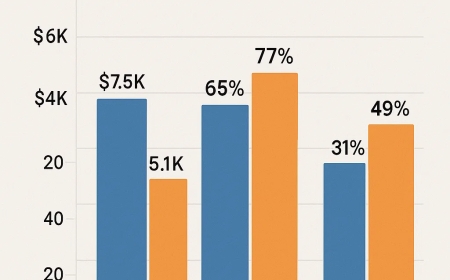Real Estate Tax Benefits Every Investor Should Know
Discover the essential real estate tax benefits every investor should know. Learn how these incentives can enhance profitability and support long-term growth.

Real estate investing offers more than just rental income and property appreciation. One of the most significant advantages that often goes overlooked is the range of tax benefits available to property investors. Whether you're a seasoned investor or just starting out, understanding these tax breaks can significantly improve your return on investment.
1. Depreciation Deductions
Depreciation is one of the most powerful tax tools available to real estate investors. Even though real estate typically appreciates in value over time, the IRS allows you to deduct a portion of a property's value each year as it "wears out."
For residential properties, depreciation is typically spread out over 27.5 years, while commercial properties depreciate over 39 years. This annual deduction can offset rental income, reducing your taxable income without requiring a real cash expense.
2. Mortgage Interest Deductions
Another major benefit is the ability to deduct mortgage interest. If you've taken out a loan to buy an investment property, the interest you pay on that loan is often tax-deductible.
For most investors, mortgage interest represents a significant portion of their monthly expenses. Being able to deduct this cost reduces your taxable income and improves the overall profitability of your property.
3. Property Tax Deductions
Real estate investors can also deduct the property taxes paid on investment properties. This is another annual expense that can be subtracted from rental income when calculating your tax bill.
Local and state property taxes vary, but the savings from this deduction can add up over the years. Its another incentive that makes owning real estate more financially attractive than other types of investments.
4. Operating Expense Deductions
All ordinary and necessary expenses for managing and maintaining a rental property are typically deductible. This includes:
-
Repairs and maintenance
-
Property management fees
-
Utilities (if paid by the landlord)
-
Insurance premiums
-
Advertising costs for tenants
These deductions reduce your net rental income, decreasing your tax liability. Keeping organized records of these expenses throughout the year can make a big difference during tax season.
5. Capital Gains Tax Advantages
When you sell a property, the profit you earn may be subject to capital gains tax. However, real estate investors benefit from favorable long-term capital gains rates if they hold the property for over a year.
Instead of being taxed at your ordinary income rate, which can be much higher, long-term capital gains are taxed at lower rates. This can result in significant savings when selling appreciated properties.
6. 1031 Exchange Opportunity
Section 1031 of the Internal Revenue Code allows investors to defer capital gains taxes when they sell one investment property and reinvest the proceeds into another "like-kind" property.
This strategy, known as a 1031 exchange, enables investors to grow their real estate portfolios without being immediately taxed on their gains. While the rules are specific and the process requires careful planning, it's one of the most effective ways to build long-term wealth through real estate.
7. Passive Income and Loss Rules
Rental income is considered passive income by the IRS. This classification has unique tax implications. In certain cases, investors can use passive losses (such as those generated through depreciation or operating costs) to offset other passive income, reducing overall taxable income.
Additionally, if your total income falls within certain thresholds and you're actively involved in managing your properties, you might be able to deduct up to $25,000 of passive losses against your ordinary income.
8. Home Office Deduction
If you manage your investment properties from a dedicated home office, you may qualify for the home office deduction. This can include a portion of rent or mortgage, utilities, and internet costs.
To claim this deduction, the space must be used exclusively for business purposes. This is a valuable benefit for small landlords and property managers who operate from home.
9. Travel and Mileage Deductions
If you travel for property management, maintenance, or tenant-related issues, you can often deduct mileage, airfare, and lodging costs. Whether you're driving to collect rent or flying out to inspect a long-distance property, these expenses may qualify as business-related.
Its important to maintain detailed records of your travel, including dates, locations, and purpose, to ensure compliance with tax regulations.
10. Qualified Business Income (QBI) Deduction
Real estate investors who treat their rental activities as a business may qualify for the Qualified Business Income deduction. This deduction, introduced under tax reform, allows eligible taxpayers to deduct up to 20% of their qualified business income from taxable income.
While not all rental activity qualifies, those who operate multiple properties, actively manage them, and keep proper documentation are more likely to benefit from this deduction.
Final Thoughts
Understanding the full scope of real estate tax benefits can transform your investing strategy. These tax incentives are designed to encourage investment in housing and infrastructure, and savvy investors who leverage them can significantly enhance their financial outcomes.
Keeping thorough records, staying informed about current tax laws, and working with a knowledgeable tax professional can help you make the most of these opportunities. In the long run, minimizing your tax liability can be just as impactful as maximizing your rental income.
Important Links
Meet the Visionaries Behind the Project: Dunearn Road Condo Developer
Your Complete Guide to Dunearn Road Condo Project Details
Unveiling the Prime Appeal of the Dunearn Road Condo Location
Discover the Charm of Dunearn Road New Condo
Dunearn Road Condo Pricing: A Strategic Investment in Prime District 11
Dunearn Road Condo Project Details
Dunearn Road Condo Floor Plans
Dunearn Road Condo Floor Plans








&srotate=0)






















